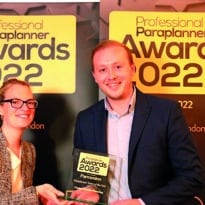Warren Bentham, head of paraplanning for 75point3, epitomises the added value that paraplanners can bring to adviser businesses. He talked to Rob Kingsbury about having a role that is ‘as varied as possible’
It is a sound argument that paraplanners can bring much more to a financial planning business than just their paraplanning capabilities. Often, their research and analytical skills, experience and knowledge can be invaluable to a business that is looking to develop and grow.
Warren Bentham, head of paraplanning for chartered financial planning firm 75point3, is a case in point. As well as a hands-on paraplanner, providing a financial research and report writing service to a number of financial advisers within the firm, he sits on the firm’s investment committee – helping to manage the firm’s investment proposition and bespoke model portfolios – and also undertakes additional roles within the company in the areas of back-office system configuration, adviser and paraplanner training, and qualification planning and compliance.
Warren joined financial services in 2000 and over the past 16 years has been a paraplanner, financial adviser and mortgage broker. He is a Fellow of the Personal Finance Society and Chartered Financial Planner, holds the Level 6 qualification from the IFP/CISI (although he is unable to use the Certified designation as he is not an IFP/CISI member) and overall has 485 CII credits to his name. He is also deputy president of his local CII branch.
“I want to use the knowledge, experience and the qualifications I have gained over the years to help the business grow,” Warren says. “The managing director is aware that I want to do more within the company, which is why my remit has been expanded and I am involved in far more of the development of the business than might be expected of a paraplanner.”
Career path
So what was Warren’s route to where he is now? Having gained a degree in economics from the London School of Economics in 2000 and knowing he wanted to work in finance, Warren says he saw an advert to join a financial advice company that was starting up in London. That firm turned out to be a branch of the advisory company, Inter-Alliance. The job was in an office of eight financial advisers who had been recruited from Barclays and the job on offer was one of three paraplanning roles.
“Knowing nothing about financial services it was a steep learning curve first to be a paraplanner, secondly, to be joining a relatively large start-up financial planning business, and thirdly, where the financial advisers were learning to be whole of market rather than tied agents,” Warren says. What’s more, within 12 months the firm had grown to 26 advisers, when the company acquired the tied sales force of another firm. “We found ourselves split over three offices, and we were having to go in to each to teach the advisers what independent financial advice was all about,” he says.
There was a heavy sales bias to the work but Warren says he was “lucky” in that he was paraplanning for “an adviser who had G60 and G10, so was advanced qualified even then and had all the technical knowledge.” It was that adviser’s guidance and mentorship that got Warren started “on the technical side of things and more interested in the underlying principles of financial planning than the average adviser who at the time was more focused on the sales side,” he says.
“He encouraged me to take exams and to learn more and I learnt a lot just from doing his reports,” Warren says.
In the first two years Warren gained his FPC qualifications and CeMap and started advising part-time around his paraplanning work.
When Inter-Alliance made its paraplanners redundant and hired them back on a self-employed basis, Warren started doing more on the advising side and charging advisers for his paraplanning work directly.
After a year a change in his personal circumstances meant a move to North Wales where, he says, “because I didn’t have my own client bank to work with and not being one who likes being out of work” he accepted a job as a mortgage adviser with the Woolwich (now Barclays). Advising on a narrow range of mortgages he found “frustrating’ and although he “loved the advising side where I would be doing five to eight client meetings a day” the role “taught me what I didn’t want to do”, he says.
He then moved to working on a self-employed basis with several mortgage broking firms that wanted a financial adviser who knew mortgages but also was qualified to give wider financial advice.
The Financial Crisis and the collapse of the main firm for which he was working saw him with business to place and nowhere to take it. “So I walked into 75point3 with business in my hand and they offered me a self-employed position.”
Return to paraplanning
A few months later, the managing director asked him if he would do one day a week paraplanning for one of the directors and that quickly turned into a full-time role. “But I retained CF30,” Warren says. “That’s not because I want to become an adviser again but rather that I like the ability to not have to curtail what I say when I speak to clients. So if a client asks me a direct question I can answer it.”
It was from that point in 2009 that Warren realised that although he had liked advising, “to some extent I was treading water and it was paraplanning that I enjoyed and that was where I was going to make my career,” he says.
Asked about his ambitions now, Warren says he is considering STEP Certificate for Financial Services and possibly a Masters course. And he adds, referring to his 485 CII credits: “I’d like to get another 15 credits, just to bring my total up to a nice round number.”
Typical week
Asked to describe a typical week, Warren says:
“I like to keep my job as varied as possible. What I like about 75point3 is that they give me the opportunity to get involved in the business, so I have a more rounded knowledge and approach to the business and the work we do. And that includes the long-term aims of the business too.
“I mainly work with two directors, who will provide me with the client files of the cases they want me to work on. I will sort out what the administrators need to do and then divvy up the work between myself and Martyn, the other full-time paraplanner.
“Then it’s down to the individual case and what research is necessary, whether there is cashflow modelling involved, and once all the elements have been done I’ll sit down with the adviser and we’ll formulate the advice including the investment plan, tax planning and so on. Then I’ll do the report and gather the relevant paper work for the adviser who will then see the client again.’
Occasionally, Warren says, he will sit in on client meetings. “Mainly that will be where the client may have more complex issues, as we feel it is better I’m there to hear what the client is saying rather than get the information second hand. Also, it allows us to discuss specific aspects or ways to approach the case, which can be much easier to do if I was there in the meeting.”
Warren also sits on the investment committee, alongside one of the other advisers and the managing director. “At the most recent meeting we reviewed our current fund selection, we contemplated adding another fund so I am now doing the research on that, and we also looked at our charging structure and whether it needed to be tweaked,” he says.
“I may get compliance queries also, as I’m the compliance officer’s contact in this office. I will do some of the work for FCA reporting. In addition, I co-ordinate the back-office: We use Intelligent Office and I am the liaison with Intelliflo. Anyone who has issue with the system will contact me and hopefully, we will be able to resolve it or I’ll refer them on to Intelliflo.”
To ensure a smooth workflow in the office, he says, “it’s about getting the process right so everyone knows what they should be doing and work doesn’t get repeated –because that makes it easier for everyone. So when a case goes to the administrators the file doesn’t come back until everything that is needed for me to do what I need to do is in the file. Being able to trust the administrators to do that is great for the workflow of the business and means everyone is focused where they need to be focused.”
Alongside these duties Warren also co-ordinates the training for members of the firm who are taking exams – advisers, paraplanners and administrators. “The general ethos of the company is that if someone wants to improve their knowledge and take exams to gain qualifications that are relevant we’ll encourage them to do so and pay for the materials and exams,” he says. “That’s from the top down. The managing director has just attained his Masters in Finance and he’s also a Chartered Banker.
“That creates competition in the office, which is a healthy driver to keep ourselves learning and to doing our best for our clients.”





























